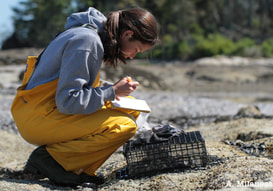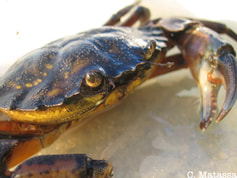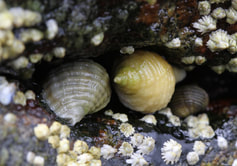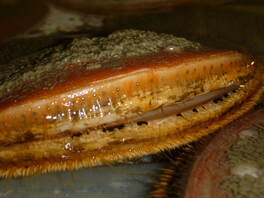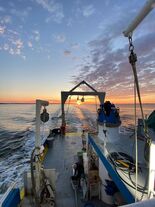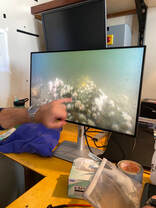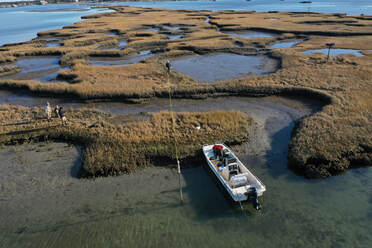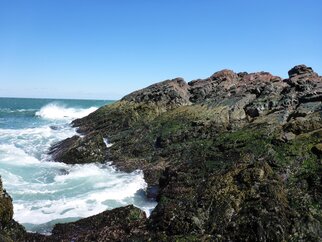Behavioral and Community EcologyAs benthic ecologists, our research aims to understand processes that structure marine communities. In the Matassa Lab, we are particularly interested in the ways that the traits or behavior of individuals can scale up to shape community dynamics and ecosystem function and how communities change over short and long time scales. Our approach is to use manipulative field and laboratory experiments that address theory and identify the mechanisms underlying the ecological and evolutionary outcomes of species interactions.
|
The "Ecology of Fear"The ecological consequences of predators scaring their prey can be seen in many systems, from wolves and elk to sharks and turtles. On rocky shores, predatory green crabs cause prey dogwhelks to spend more time hiding in crevices and less time foraging on mussels and barnacles, resulting in a behavioral trophic cascade. Prey foraging decisions and their cascading effects depend on a suite of physiological and environmental factors, each of which acts to shift how prey balance the costs and benefits of foraging. Predation risk not only influences when and where prey choose to eat, but also affects how prey use the energy they consume. For example, the presence of predatory crabs limits the ability of their dogwhelk prey to convert food into biomass, reducing the efficiency of energy transfer among trophic levels and producing "trophic heat." Risk effects on energy transfer, an important ecosystem function, can have major consequences for biodiversity and food web stability.
|
|
Vulnerability of Marine Species to Climate ChangeHow are marine species responding to climate change, and how might these responses impact the livelihoods of people and communities that rely on marine ecosystems? We collaborate with oceanographic modelers and social scientists to understand how the vulnerability of fisheries and fishing is linked to the ecological vulnerability of targeted marine species. Current work sponsored by NOAA-OAP is examining how ocean acidification and warming could impact the social-ecological system surrounding the Atlantic Sea Scallop fishery. Links: UConn Today, NOAA
|
Benthic Ecology of Long Island SoundLong Island Sound boasts diverse and dynamic ecological communities along its shores and at its depths. These communities are highly dynamic, frequently changing in their species composition, size, and location depending on available habitat. Knowing where these key habitats are located and understanding their biodiversity and connectivity is critical for making informed decisions for marine spatial planning in Long Island Sound and beyond. See also: lismap.uconn.edu
|
Salt Marsh Ecology and ConservationDespite their high ecological, economic, cultural value, salt marshes are experiencing massive die-offs often driven directly or indirectly by human activities. In cooperation with non-profit groups and community members, we are currently conducting experiments to identify the cause(s) of marsh loss in a southern New England estuary. It's not an easy task, but understanding the processes responsible for marsh die-off is necessary to slow or reverse ongoing loss of this critical coastal habitat.
|
Intertidal MacroecologyHow do large-scale environmental forces interact with local processes to control the distribution of species? Rocky intertidal communities spanning the Gulf of Maine (GoM) vary in their structure, dynamics, and productivity despite having the same suite of species. Collaborations with theoretical ecologists, coastal oceanographers, larval ecologists, and biogeochemists are allowing us to examine how regional differences in benthic processes (thermal stress, consumer pressure) are driven by different patterns of population connectivity and recruitment in key species.
|
All photographs and content copyright Catherine Matassa 2023,
